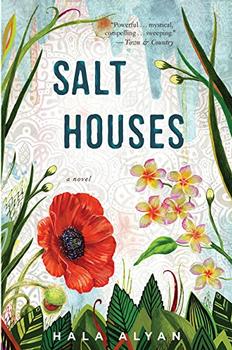Summary | Excerpt | Reading Guide | Discuss | Reviews | Beyond the Book | Readalikes | Genres & Themes | Author Bio

"Khalto Salma, has it dried yet?" Around the table, the women watch her with anticipation. Though the captivation, she knows, is mostly among the younger women—her nieces and cousins who'd arrived from Amman for the wedding, Alia's classmates, whom she still thinks of as children. Even Alia, leaning on her elbows —Salma has the desire to tell her to sit up, to tell her that men hate chalky elbows, but then remembers Atef, the man who is accepting her daughter, elbows and all —looks interested.
The elders—Salma's sisters and neighbors and friends —watch the cup reading calmly. They've seen their mothers do this and their mothers' mothers. As far as they are concerned, such happenings are as commonplace as prayer.
"Has it stuck?" one of the nieces asks.
"I wonder what it says."
Salma blinks her thoughts away, rearranges her features. She glances down at the cup, tilts it, frowns. What she has seen is not a mistake.
"It needs more time. I'll turn it around for another few minutes. The dregs must dry."
Poor Widad. Salma feels a familiar ache at the thought of her older daughter. She was a woman, sixteen years old, when they left Jaffa. During those three days of terror before they decided to go, as they waited by the radio for news, it was Widad who cared for Alia, carrying her from room to room, boiling rice with milk and sugar to spoon into her mouth.
She'd made a game of the gunfire and artillery. Widad would raise her eyebrows in mock amazement, feigning delight at the muffled explosions outside. Alia clapped her toddler hands, giggled. Resourceful, Salma has often thought about her eldest, though whatever luminosity Widad has seems to materialize only in moments of crisis. Otherwise, she walked around their new house in Nablus wanly, sat through meals without speaking. She never mentioned Jaffa, and when her father, already ailing, told her it was time to marry, she didn't protest. Only with Salma did she cry, tears falling as she sat in the garden, her body hunched over the steam from her teacup.
"He will take me to Kuwait," she said, weeping, and Salma touched her daughter's hair, pulled her to her breast. The tea oversteeped as minutes passed. Ghazi was a good man, had the steadiness and loyalty that would make a fine husband, but her daughter saw only a paunchy, chinless stranger with spectacles, a man who wished to take her to a drab villa compound in the desert. Salma's heart hurt at the thought of her daughter becoming someone's young, unhappy wife in a foreign country, but she knew it was for the best.
She never told Widad the truth, how Hussam had consulted her on the matter of Widad's suitors, which he'd narrowed down to two men. The other was an academic, a professor of philosophy at the local university. Salma knew his sister from the mosque; he came from a well-mannered, educated family. But he was mired in Nablus, in Palestine—he would live and die here.When Hussam asked the boy where he intended to settle down, he answered, "In my homeland, sir. Nothing under this sky will budge me."
Salma, to Hussam's surprise, chose Ghazi. At the time, the logic of her verdict was nebulous to her, half formed. It was only when she sat in the mosque and felt relief that she understood her own actions. Widad would be kept safe in Kuwait, far from this blazing country split in two. Her unhappiness, if it came, was worth the price of her life.
Alia was at the ceremony, of course. Eight years old, in a taffeta dress that made a crunching sound when she sat. She twirled outside the mosque, swung her hips like a bell as Widad and Ghazi emerged wed. When Hussam died, Salma had expected Alia to bawl, demand an explanation. But the girl was the calmest of her three children.
"Baba is not hurt anymore?" she'd asked solemnly. And they all wept and embraced the girl—Widad and Salma and her son, Mustafa.
Excerpted from Salt Houses by Hala Alyan. Copyright © 2017 by Hala Alyan. Used by permission of Houghton Mifflin Harcourt Publishing Company. All rights reserved.
Your guide toexceptional books
BookBrowse seeks out and recommends the best in contemporary fiction and nonfiction—books that not only engage and entertain but also deepen our understanding of ourselves and the world around us.